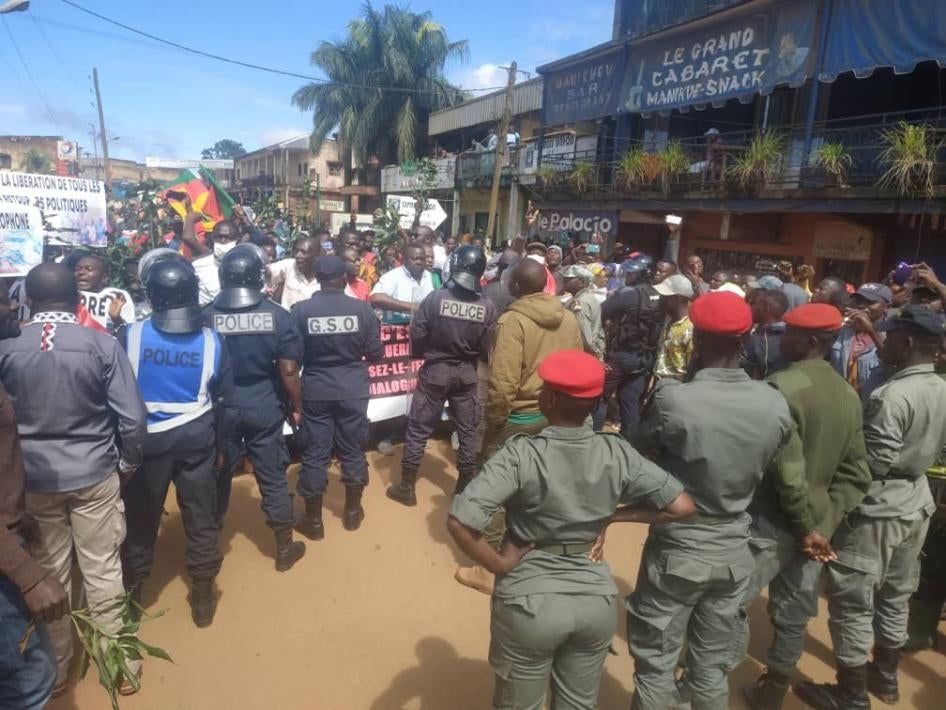(Nairobi) – A declaration by Cameroon’s territorial administration minister to make two opposition coalitions illegal is part of a government crackdown on opposition and dissent, Human Rights Watch said today.
On March 12, 2024, the minister, Paul Atanga Nji, said in a statement that the Political Alliance for Change (Alliance politique pour le changement, APC), led by Jean-Michel Nintcheu, and the Political Alliance for Transition in Cameroon (Alliance politique pour la transition, APT), led by Olivier Bile, are “illegal,” calling them “clandestine movements.” The minister also referenced a recent meeting at a prison in Yaoundé between Nintcheu and Sisiku Julius Ayuk Tabe, a leader of the Anglophone separatist group Ambazonia Interim Government, as a factor in the decision to ban the coalition.
“The government’s move against these coalitions shows how the Cameroonian authorities are moving to close down space for the opposition and for public debate ahead of the 2025 presidential elections,” said Carine Kaneza Nantulya, deputy Africa director at Human Rights Watch. “The authorities should immediately lift the ban and allow opposition parties to continue working without harassment.”
In December 2023, a prominent opposition leader, Maurice Kamto, was reelected as the leader of the Movement for the Renaissance of Cameroon (Mouvement pour la renaissance du Cameroun, MRC), one of the most prominent opposition groups in the country. Kamto used his reelection to announce the creation of the APC.
The current president, Paul Biya, has been in power since 1982 and is serving out his seventh term. Biya, 91, was last reelected in 2018 after a contested vote-counting process. Kamto challenged the official results and declared himself winner of the election.
Biya’s 2018 election sparked a wave of political repression. After the 2018 vote, opposition-led protests occurred across the country, and the government responded with a heavy crackdown and the use of excessive force by the police, army, and gendarmes. In January 2019, Kamto and over 200 of his supporters were arrested and detained. Kamto was charged with insurrection, hostility against the homeland, criminal association, threats to public order, rebellion, and inciting insurrection, crimes that can carry the death penalty. He was freed on October 5, 2019, and the charges were dropped, though the crackdown on the opposition continued.
In early September 2020, Cameroon authorities banned demonstrations across the country after Kamto’s MRC encouraged people to take to the streets over the government’s decision to call regional elections in December 2020. Opposition parties had expressed concerns that the elections could not be conducted freely and fairly without reforming the electoral code and addressing the lack of security in the country’s minority Anglophone regions, where separatist groups and security forces have repeatedly clashed.
On September 22, 2020, Cameroonian security forces fired tear gas and water cannons and arrested over 550 people, mainly opposition party members and supporters, to disperse peaceful protests across the country. Many peaceful protesters were beaten and mistreated while being arrested and in detention.
While the majority of Kamto’s supporters who were arrested in 2019 were eventually released, 41, including Olivier Bibou Nissack and Alain Fogue Tedom, two of the group’s leaders, remain behind bars after being sentenced to seven years.
When initiating the APC in December 2023, Kamto said that the opposition should rally behind one candidate for the next presidential elections, slated for late 2025. Biya has not announced if he will run again for reelection.
Opposition groups simply coordinating activities and forming alliances cannot be considered “clandestine movements;” instead, this coordination should be considered a normal and important feature of the democratic process, Human Rights Watch said.
Activists have expressed doubts over the legality of the government’s ban. “This decision is not based on any legal texts,” Emmanuel Simh, a prominent rights activist and lawyer for the MRC, told Human Rights Watch. “No law in Cameroon prevents legally established parties getting together to establish a coalition. It’s just repression and another attempt to muzzle the opposition, to prevent it from organizing ahead of the next presidential elections.”
The government's decision to ban the two political coalitions violates the rights to freedom of expression, association, peaceful assembly, and the right to participate in political life . These rights are guaranteed under international human rights law including expressly in the International Covenant on Civil and Political Rights and the African Charter on Human and Peoples’ Rights, both of which Cameroon has ratified.
“Cameroonians have watched Biya weaken any meaningful political opposition over the course of the last four decades and this ban is yet another example of the government’s repression,” Nantulya said. “He should consider his legacy and encourage authorities to facilitate and deliver a credible election process with full respect for fundamental rights and freedoms.”
Cameroon: Government Bans Opposition Coalitions
Solidifies Crackdown on Free Association, Expression Ahead of 2025 Vote
Your tax deductible gift can help stop human rights violations and save lives around the world.
Most Viewed
-
August 29, 2024
South Korea’s Digital Sex Crime Deepfake Crisis

-
October 16, 2012
Death of a Dictator

-
August 28, 2024
Sudan: Warring Parties Execute Detainees, Mutilate Bodies

-
August 27, 2024
Taliban’s Relentless Assault on Afghan Women’s Bodies, Autonomy

-
August 26, 2024
Israel: Palestinian Healthcare Workers Tortured



